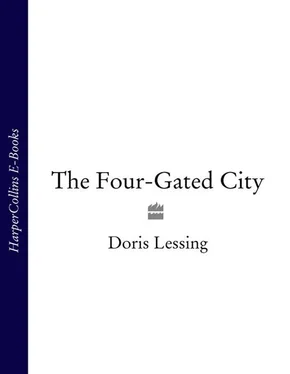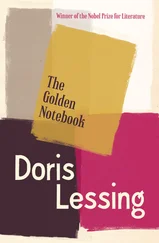The sick woman ground her teeth with rage, picked up the photograph, looked at it with hatred, then flung it down to break into a mess of glass and wood. Then she went into the study. On a long table against one wall stood Jimmy’s models of possible electronic machines. One of them was a development of existing machines that could chart the human brain in terms of electric impulses. These machines she systematically smashed. Then she went downstairs again, locking the door into the basement behind her.
Late that night Martha, on her way up to bed, saw the study door open. Mark was sitting by his desk, and the face he lifted was the white black-eyed mask.
‘Martha, will you get rid of that – picture? I can’t.’
She went to the bedroom, swept up the glass and the bits of frame, and took up the photograph of young Lynda – undamaged. It was hard to tear up that beautiful face, but she tore it up, and disposed of it all in the rubbish bin.
As she passed the study for the second time, Mark called her in.
‘I’m going to see if I can find my brother,’ he said.
This could have been foreseen, if she had been awake? Possibly. It was a shock. She sat down, opposite his challenger’s face, to challenge him.
‘You can’t.’
‘I’m going to.’
‘What did you have in mind? That you’d turn up in Moscow and say, “Where is my brother?”?’ ‘Yes.’
‘But he might be anywhere – not necessarily Russia. And you wouldn’t get a visa.’
‘I know people during the war who got in and out of Nazi Germany. My brother James did once. He was on some sort of secret mission.’
‘Your brother James was working for a secret service?’
‘Well, that was the war. A lot of people did.’
‘If you get killed then Francis won’t have a father. And what will happen to Paul?’
The white face and the black bitter eyes seemed all there was of him. Then a switch turned somewhere, and he went red, and he said: ‘Capitalist propaganda. You’re an ex-communist. That’s how you are bound to talk.’
‘Never mind about communism and capitalism for the moment. But if you go bouncing about behind the Iron Curtain being a nuisance, you’ll find yourself in jug. Or worse.’
A sneer. The communist sneer. Indistinguishable of course from a sneer of any kind. But melodramatic, improbable. Particularly on this face, in this quiet study, in this house. And in Radlett Street, Bloomsbury, London.
‘Or don’t you read the newspapers?’
‘Well, really,’ he said, with a laughing sneer.
‘All right then, ask the comrades – you just ask them if you can go to an Embassy and say: I want to get a visa to let me travel to Russia so I can find my brother who has defected East because …’
‘Because he’s a spy? He’s not a spy. I tell you it’s not possible.’ ‘You’ve just said your brother James was.’ ‘That’s not … if you can’t tell the difference, then …’ ‘Probably what happened was Colin got a visit from somebody like Hilary Marsh and he got into a panic.’ ‘Colin is not the kind to scare easily.’
‘Then he was a fool not to be scared. You were scared. So was I. I’m scared now.’
‘I’ve got a lot of time for you, Martha, you know that. But when you start talking like the gutter Press, then I’m sorry.’
‘Have you actually asked any of the comrades about it? Why don’t you?’
‘I shall. Goodnight.’ And he dismissed the enemy.
She remained the enemy for some weeks. Night after night he asked his friends in, or went to their homes. She was not introduced to them: they met on the stairs with nods and smiles. Then, as a result of Mark’s inquiries, Patty Samuels came to the house, on a proper, formal interview, to see Mark. They were together for an hour or more. Martha inquired what the advice had been.
Mark said, briefly, that ‘on the whole it was considered inadvisable’. Then, with an apologetic laugh and glance: ‘What a war-horse!’
But he had liked her, or had been intrigued by her. She came again, became one of the people who dropped in, by herself, or with others, in the evenings. She was a lively vital woman in her early thirties, and a veteran of the Party, absolutely unlike anyone Mark had ever met, but like dozens Martha had met – and like what she herself had been for a brief period.
Patty was the opposite, in every way, of Lynda.
And this time, Martha was able to foresee what would happen.
While Mark developed an affair with Patty, Lynda, in the basement, had a relapse, a falling back. For a time it was touch and go whether she would have to go back to hospital.
Dorothy came up to Martha, a few days after the incident of the photograph, to ask if Martha would come down to see Lynda, who was asking for her.
Lynda was in bed, crying hysterically that she was no good, she was useless, she had ruined Mark, and she didn’t understand why Mark didn’t kill her. She wished Mark had killed her. If Mark did not kill her, she would kill herself.
Martha wanted to call in Dr Lamb, who, after all, both women visited regularly, for drugs and for advice. But Dorothy, weeping, begged Martha not to do this. Dr Lamb would send Lynda back to the hospital; they would both have to go back to the hospital. Lynda added her tears and pleas to Dorothy’s. Why, then, had Lynda asked for Martha to come down?
Then Martha saw that she was Mark’s deputy. Lynda could not face Mark himself. But she could say to Martha what she was afraid of saying to Mark. Lynda did not mean to kill herself. These bitter tears and self-reproaches were a way of announcing to Mark, through Martha, and to Dorothy, and perhaps to herself, her sorrow at not being able to be Mark’s wife, and her intention of refusing to be. It was also a reproach to Mark: look, you are making me ill by asking so much of me. Mark, hearing that Lynda was ill, appeared in the basement but Lynda shrieked at him to go away. He went.
Lynda wept that she was a beast and unfit to live; but there was relief in it. Mark did not, for a while, go near the basement. But Martha was admitted, and reported to him.
For some weeks Lynda remained low, and weepy. Nothing, it seemed, could break her misery. Then Paul came home for a month’s holiday, and he made her better.
Lynda and Paul together – it was charming, delightful; they were like two children. Dorothy watched, indulgent: Lynda’s mother, she now became Paul’s as well. For Lynda still could not bear being touched. So Paul sat on Dorothy’s large, steamy, sad lap, and was hugged and given sweets. With Lynda, he played. Martha made excuses to go down and watch. She was seeing Sally-Sarah again. Yes, there she was, in her child, a bright exuberant vivid creature, all charm and peremptory emotional demand, who cuddled up to Dorothy, and flung his arms around Martha’s neck, and sat very quiet, by Lynda’s side, his hands in his lap, while he smiled and listened to her fantastic stories.
But that was in the basement. In the rest of the house, Paul was a cool, shrewd clever little boy (‘too clever by half!’ as one teacher had let drop), whom no one would dare to touch or pet or fondle.
Then, the holidays ended and Paul went back to school, and Lynda remained well.
There was a new balance in the house. Upstairs Mark was absorbed in his developing affair with Patty Samuels. It seemed that he no longer expected anything from Lynda. He saw very little of Martha, and did not speak at all about the search for his brother.
In the basement the two sick women were trying to expand their lives, to become like ordinary people. Dorothy now started to go out of the flat, which she had not wanted to do before. She shopped, sometimes went to the cinema, talked of getting a job. But Lynda did not leave the flat. They had visitors, women for the most part. When this happened Lynda made an effort to dress, and to be beautiful again. Once they invited Martha down. It turned out to be a seance. A couple of men, and half a dozen women had arrived. In the heavy curtained room, with its air that smelled of drugs and anxiety, the lights were turned low and a woman called Mrs Mellendip invoked spirits: successfully, as far as some of those present were concerned. After that, Martha tried not to go down unless the two were alone. Otherwise it was an atmosphere of inordinate tea-drinking, palm-reading, fortune-telling. They would sit through entire afternoons and evenings laying the cards again and again and again for guidance on matters like buying a new handbag or having a hairdo. They worked out the horoscopes of themselves, their friends, their doctors, and public persons. Mrs Mellendip earned her living by doing horoscopes, but did not charge Lynda or Dorothy. Without being asked, she did Martha’s. It turned out to be more of a character reading, and was very shrewd indeed. Martha said it was, but that she had not learned anything about herself she did not already know. To which Mrs Mellendip, a large, forceful, handsome woman in her middle fifties, returned: ‘Well, dear, I could tell you more if you knew it.’ Which remark was very much the note or tone of these gatherings. For when the tea-leaves or the cards confirmed what a person already knew, this was not a sign of failure, but of success, and added to Mrs Mellendip’s confidence in herself, and her powers.
Читать дальше












